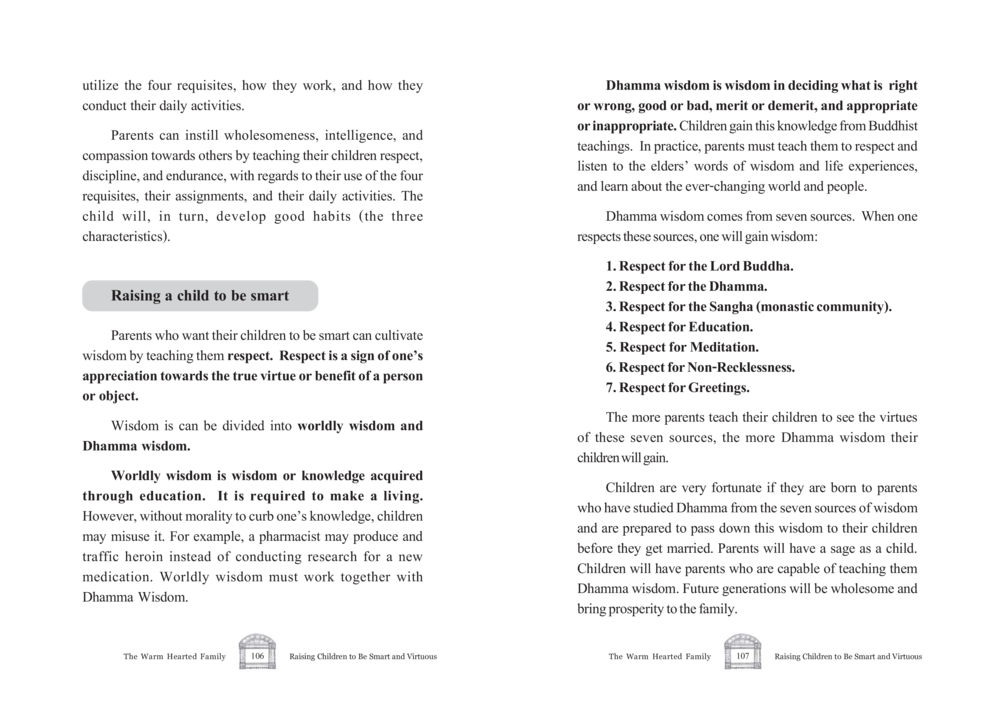Raising Smart and Virtuous Children : หน้า 54/207
The Warm Hearted Family : หน้า 54/207 Guidance for parents on teaching respect, wisdom, and compassion in children's upbringing using the four requisites.
0 ครั้ง

สรุปเนื้อหา
การเลี้ยงดูเด็กอย่างชาญฉลาดรวมถึงการปลูกฝังคุณธรรมและสติปัญญาผ่านการสอนการเคารพวรรณกรรมและประสบการณ์ของคนที่มีคุณธรรม โดยการใช้สี่สิ่งจำเป็นในชีวิตและความวิตกกังวลเรื่องความรู้ทางโลกและผลงานของธรรมะเด็กจะมีเหตุมีผลและรู้ปรับตัวต่อสังคมและสิ่งแวดล้อมอย่างเหมาะสม การเคารพในแหล่งที่มาของปัญญาที่สำคัญ ทำให้เกิดความเข้าใจที่ลึกซึ้งเกี่ยวกับสิ่งที่ดีและไม่ดีในชีวิต และสร้างครอบครัวที่อบอุ่น และประสบความสำเร็จในอนาคต.
หัวข้อประเด็น
-การเลี้ยงดูเด็ก
-สติปัญญา
-คุณธรรม
-การเคารพ
-การเรียนรู้จากธรรมะ
-ความสัมพันธ์ในครอบครัว
ข้อความต้นฉบับในหน้า
utilize the four requisites, how they work, and how they
conduct their daily activities.
Parents can instill wholesomeness, intelligence, and
compassion towards others by teaching their children respect,
discipline, and endurance, with regards to their use of the four
requisites, their assignments, and their daily activities. The
child will, in turn, develop good habits (the three
characteristics).
Raising a child to be smart
Parents who want their children to be smart can cultivate
wisdom by teaching them respect. Respect is a sign of one's
appreciation towards the true virtue or benefit of a person
or object.
Wisdom is can be divided into worldly wisdom and
Dhamma wisdom.
Worldly wisdom is wisdom or knowledge acquired
through education. It is required to make a living.
However, without morality to curb one's knowledge, children
may misuse it. For example, a pharmacist may produce and
traffic heroin instead of conducting research for a new
medication. Worldly wisdom must work together with
Dhamma Wisdom.
Dhamma wisdom is wisdom in deciding what is right
or wrong, good or bad, merit or demerit, and appropriate
or inappropriate. Children gain this knowledge from Buddhist
teachings. In practice, parents must teach them to respect and
listen to the elders' words of wisdom and life experiences,
and learn about the ever-changing world and people.
Dhamma wisdom comes from seven sources. When one
respects these sources, one will gain wisdom:
1. Respect for the Lord Buddha.
2. Respect for the Dhamma.
3. Respect for the Sangha (monastic community).
4. Respect for Education.
5. Respect for Meditation.
6. Respect for Non-Recklessness.
7. Respect for Greetings.
The more parents teach their children to see the virtues
of these seven sources, the more Dhamma wisdom their
children will gain.
Children are very fortunate if they are born to parents
who have studied Dhamma from the seven sources of wisdom
and are prepared to pass down this wisdom to their children
before they get married. Parents will have a sage as a child.
Children will have parents who are capable of teaching them
Dhamma wisdom. Future generations will be wholesome and
bring prosperity to the family.
The Warm Hearted Family
106
Raising Children to Be Smart and Virtuous
The Warm Hearted Family
107
Raising Children to Be Smart and Virtuous
หน้าหนังสือทั้งหมด

1

2

3

4

5

6

7

8

9

10

11

12

13

14

15

16

17

18

19

20

21

22

23

24

25

26

27

28

29

30

31

32

33

34

35

36

37

38

39

40

41

42

43

44

45

46

47

48

49

50

51

52

53

54

55

56

57

58

59

60

61

62

63

64

65

66

67

68

69

70

71

72

73

74

75

76

77

78

79

80

81

82

83

84

85

86

87

88

89

90

91

92

93

94

95

96

97

98

99

100

101

102

103

104

105

106

107

108

109

110

111

112

113

114

115

116

117

118

119

120

121

122

123

124

125

126

127

128

129

130

131

132

133

134

135

136

137

138

139

140

141

142

143

144

145

146

147

148

149

150

151

152

153

154

155

156

157

158

159

160

161

162

163

164

165

166

167

168

169

170

171

172

173

174

175

176

177

178

179

180

181

182

183

184

185

186

187

188

189

190

191

192

193

194

195

196

197

198

199

200

201

202

203

204

205

206

207
หนังสือที่เกี่ยวข้อง
Load More
